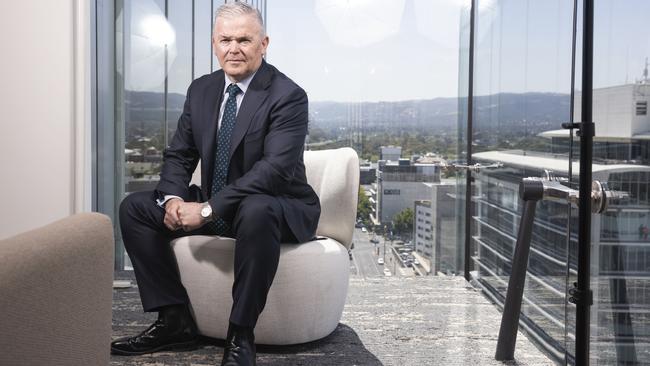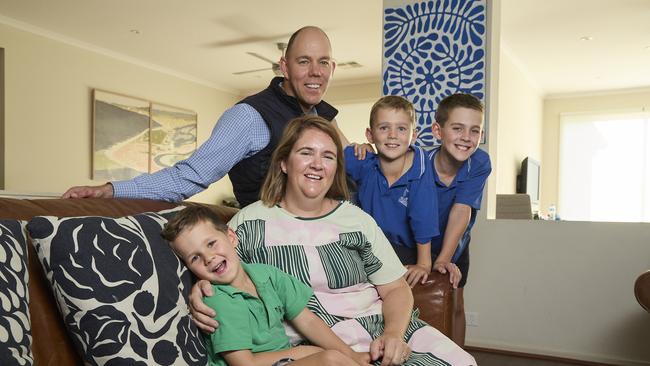Santos implements nine-day fortnight for workers amid push for reduced workdays nationwide
One of the country’s biggest companies trialled a nine-day fortnight, with results so impressive it’s now a permanent perk. It could signal big changes for burnt-out workers nationwide.
SA News
Don't miss out on the headlines from SA News. Followed categories will be added to My News.
Thousands of employees at one of South Australia’s biggest companies are now working nine-day fortnights without reduced pay – and have become more productive than ever.
The move could signal a big shift in the way South Australians work, with new research suggesting flexible rosters could soon become the norm across industries.
After a quietly successful trial last year, Santos has permanently implemented a nine-day fortnightly roster for its Australian-based staff in a bid to increase work-life balance and employee wellbeing.
Labelled ‘Flex Friday’, all Australian office-based non-rostered employees working at least 0.8 FTE can take designated Fridays off work, usually the first and third of the month.
Under the flexible arrangement, workers are required to accumulate their full fortnight’s worth of hours within nine days with no reduction in productivity.
Field employees, rostered office-based roles or operational roles are not eligible for the program.
Santos chief executive Kevin Gallagher admitted he was sceptical about the arrangement when it was first trialled last year, but said the nine-day fortnight’s success was overwhelming, boosting both wellbeing and productivity.
“Last year’s trial was aimed at understanding whether we could do this without compromising the company’s operational needs, business performance and productivity,” Mr Gallagher said.
“Data analytics, as well as employee feedback, proved that Flex Friday actually improved productivity in most business areas and it was extremely popular with staff.”

With booming corporations like Santos facing challenges when it comes to recruitment of skilled workers, Mr Gallagher said the company’s initiative hoped to retain and attract the capable workforce it needed.
The federal government’s 2023 Skills Priority List revealed that 36 per cent of occupations were in national shortage (332 out of 916), about five percentage points higher than 2022.
“We are competing for the best people with many other companies and creating a positive workforce culture is key to both the capability of our workforce and business performance,” Mr Gallagher said.
“Having a fixed ‘Flex Friday’ every fortnight allows teams to plan and organise their work across the other nine work days.
“That way, Santos can maintain our business performance and at the same time our people can plan their days off, whether that be spending more time with family or friends, taking a long-weekend away, leisure activities or life administration such as getting the car serviced.”
Shortly after the trial kicked off last year, Santos integrated planning manager Lucia Walsh said the flexibility afforded by the arrangement had been invaluable for her family.
“I have three young boys, so having the flexibility to plan ahead knowing I’ll have that day to get things done is very helpful,” she says.
“My team is getting just as much, if not more, work done and it allows me to organise the working week knowing that I can use that day to focus on our family.”

New research has revealed that one in four Australian workers believe it will be normal to have full flexibility over hours in five years, while 11 per cent said their employer already offered a four-day work week.
A large-scale employee survey conducted by the ADP Research Institute found the number of employers offering four-day work weeks had increased by 8.6 per cent in 2023, with that figure expected to continue rising.
ADP ANZ Managing Director Kylie Baullo said a shortened work week was rapidly becoming a tangible reality in Australia as the aftershocks of the Covid pandemic forced employers to think outside the box for worker retention.
“When traditional approaches like pay rises or offering remote work arrangements are not feasible, employers should explore innovative ways to ensure employee satisfaction, loyalty, motivation, and talent retention,” Ms Baullo said.
“If a four-day working week aligns with business needs, enabling workers to achieve a better work-life balance without compromising productivity, this will result in a mutually beneficial outcome for all.
“Numerous businesses are already reaping the advantages of this change.”
Defence and security company BAE Systems offered a nine-day fortnight to workers on its Hunter-class frigate program in 2021, while accounting firm Grant Thornton introduced a nine-day fortnight trial last year.





